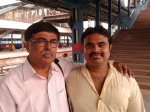Bapi: You are considered to be a part of the Hungryalist movement. Is it proper ? Because, during the Hungry Generation movement in the 1960s, only two thin poetry collections of yours were published ; ie., Shoytaner Mukh published by Sunil Gangopadhyay and Jakham published by Subimal Basak. However, your literary fame started some 20 years the Hungryalist movement withered away, when your poetry collection Medhar Batanukul Ghungur and your novel Dubjaley Jetuku Proshwas were published. That has been the learned observation of academic readers. Have you ever made a self-assessment regarding this aspect ?
Malay: Critics did identify me that way about 30-40 years earlier ; that is because the Hungryalist movement was started by me. Now that a number of titles of mine have been published, I presume I am not branded that way anymore. This aspect has not at all been raised by Dr Tapodhir Bhattacharya, Satyajit Bandopadhyay, Udayan Ghosh, Barin Ghoshal, Ajit Ray, Zahirul Hassan, Samir Sengupta and others who have discussed my fictions and poems in2001 in the collection of articles edited by Murshid A.M. Since you reside far away from Kolkata, you appear to live in that past glory. I would prefer that whatever I have written be discussed in a panorama. I don’t want evaluation of my identity.
Bapi: I think your personality has got mixed up with your Hungryalist image, and as a result the creative genius of poet and prose architect Malay Roychoudhury has been submerged beneath it. In the Hungry Sakkhatkarmala interview collection of yours edited by Ajit Ray, all the fifteen interviewers have repeated the same boring questions about the Hungry Generation movement. Ahabkal magazine edited by Ratan Biswas, which was published during 2002 Kolkata Book Fair, exclusively on your work, has glorified your Hungryalist image. How would you react to it ?
Malay: Modernist critics, as an easier way to enter a text, used to concentrate on the author’s person. And they were elated if they could catch hold of an image. It is just a colonial remnant; an analytical tool imposed by Europe. In traditional Indian literature, the authors were never given importance. Nobody has any idea of the identity and image of Krittibas Ojha and Bharatchandra. British imperialism had imported community-neutral image of the individual. After the Britishers departed, modernity has started disappearing in our postcolonial life. The critics who are still suffering from European canons of modernity are the persons who concentrate their focus on the writer rather than what he has written. The canon of hoisting the image was placed at the centre-stage of epistemic world of European imperialism. Nevertheless, some critics do claim that I have started surpassing my writings. I do not have any role in it.
Bapi: Your birth, childhood, youth, education etc everything have happened in Patna. Your childhood was spent in the Imlitala slum of Bakharganj. Comparison of your origin is impossible with the middle class non-resident writers such as Bibhutibhushan, Sharadindu, Bonoful, Satinath and Subodh Ghosh. With that sort of background how did you emerge as one of the foremost writer of Bengali literature ?
Malay: Other writers write for money, fame, honour, domination, awards etc. My literary activity has been an effort of an Outsider who endeavours to enter into West Bengali culture, in view of the fact that I belong to the family of one of the original inhabitants of Kolkata city, ie., the Sabarna Roychoudhurys. Ahabkal magazine has published my ancestral tree since 9th century. I do not think any other Bengali writer has had to bear such burden of being associated with his own culture. Apart from this, my education at Catholic Christian and Brahmo Samaj schools has been inspirational for me.
Bapi: Are movements necessary for literature ?
Malay: Hungryalism has been the only worthwhile movement in Bengali literature. Obviously, there must have been socio-political reasons. Sociologists would be in a better position to explain as to why it erupted. In the post-colonial period, no other movement is possible. The reason is the speed of consumerist society. Thus the question of necessity of literary movements in future is absurd in West Bengal.
Bapi: Such a movement in Bengali literature was not launched either from Kolkata or any place in West Bengali. It started from outside Bengal ; from Bihar.
Malay: That is because of the desire for entering West Bengali culture ; a desire to dredge the filth out of its cultural river, and recreate the streaming flow ; to kick the butts of vulgar refugee-esque literary guardians. The residents of West Bengal of that time, ie., 1960s, were not even aware of their self-imposed lethargy, inactivity, inertia, disease. Since I was born and brought up outside of West Bengal, things were quite clear to me.
Bapi: You have termed yourself a Cultural Bastard. Kindly explain it.
Malay: Go through the two explanations which Bishwajit Sen and Ajit Ray gave on the subject. Bengalies who live outside West Bengal, gradually get transformed into cultural bastards. The same has happened with me. Bishwajit and Ajit have discussed the social, political and literary dimensions of the issue. But I have presented the matter in a wider perspective. In our Roychoudhury family, Mughal and Pathan cultures intruded during my ancestor Panchanan, who was a military commander in Humayun and Akbar’s cavalry. Panchanan’s grandson Jia, who became known as the famous sage Kamadeva Brahmachari, tried to combine the values of Vaishnava and Shakta sects, by worshiping Shyama Rai and Kali at family level. His son Lakshmikanta, when he was advisor to Maharaja Pratapaditya, was imbibed in Portugese culture. I have studied in Catholic school and Brahmo school. The childhood locality of Imlitala had homes of low caste families, at that time called Untouchables. The locality of adolescence was crowded with conservative destitute Sunni Muslims. If one has to deconstruct my text he will have to go through these layers.
Bapi: What is your opinion about today’s Bengali literature ? Is it really unthinkabe to launch a literary movement any more ?
Malay: Other than my own writings I am not bothered about anything else these days. Not only in literature, no movement is possible in any other field. In other areas some pressure may be created, such as in Save Narmada River or Tribal Rights. However, the consumerist media impact in case of market literature is so all-pervasive that no movement can change the speed in life and living.
( Translated from Bengali by Indrajit Bhattacharya )


